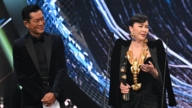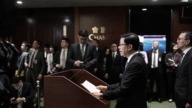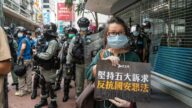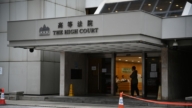【新唐人2014年09月24日讯】9月22号,当中外媒体聚焦香港大专生罢课事件时,中共国家主席习近平也在北京接见了由全国政协副主席、前香港特首董建华率领的工商专业界访京团。习近平表示,北京对香港的政策方针没有变,坚持实施“一国两制”和《基本法》,但习近平没有提及《基本法》所承诺的“港人治港、高度自治”,这让香港市民非常担心。
22号下午,习近平在北京人民大会堂接见了董建华率领的访问团。这些成员包括长实集团主席李嘉诚、恒地主席李兆基、嘉里主席郭鹤年等70多人。而主管港澳事务的中共人大委员长张德江,和中共国家副主席李源潮,也出席了会面。
习近平在开场白表示,北京对香港方针政策没有变,也不会变,并提出三个“坚定不移”,包括坚持在香港实施“一国两制”、《基本法》﹔支持香港推进民主和维持繁荣稳定。
香港立法会议员单仲偕:“他这一趟接见香港主要的专家,所谓富豪,是因为人大常委决定以后,他明白到香港有一些反弹,比如昨天开始香港有学生罢课,有占中活动等。习近平在这个时间去接见香港的富豪,主要是稳定在香港的政策,希望他们能够继续支持中央对香港的管治。”
和以往不同的是,这一次,习近平没有说“支持”特区政府依法施政,而是说:“希望在中央政府的领导下,在特区政府和行政长官的带领下,香港同胞继续推动香港取得各方面的发展。”但《新华社》事后发稿时,却把这句原话改为“在中央政府大力支持以及行政长官和特区政府带领下”,把原有的“领导”一词改回为“支持”。
香港城市大学政治学教授、“真普选联盟”召集人郑宇硕:“现在中央政府清楚表明,它要领导香港,那一国两制去哪里了,这也是香港人目前最大的担心,不单是没有民主的选举制度了,连一国两制、高度自治也没有了。”
习近平这番公开谈话,没有提到香港近期敏感的政治问题。不过当天晚上,访问团成员、政协常委陈永棋,在北京接受香港电台记者访问时透露,习近平在随后的闭门会谈中,谈到了香港的政改争议。习近平表示,在香港搞普选要符合中国国情,以及香港区情。特首人选必须是北京信任的所谓爱国爱港人士。
陈永棋还引述习近平的话说,这次人大常委会的决定,以及《基本法》的规定,香港方面必须严格遵守。对于各种破坏社会秩序的违法活动,北京坚决支持特区政府依法处置。
香港立法会议员单仲偕认为,习近平这次谈话,相较于6月推出的白皮书,在内容上,没有多大差异。
单仲偕:“他(习近平)表示强硬态度,也是一如既往,他过去有到香港来,也谈到关于管治问题,他的看法也是一样,他觉得香港是中国的一部分,虽然是所谓依法管治,你说的依法管治,其实是根据《基本法》,中央对香港有管治的权力,这个跟白皮书,只是表述的方式不同,内容是一样的。”
香港城市大学政治学教授、“真普选联盟”召集人郑宇硕指出,北京当局此次言论非常强势,令人担忧。
郑宇硕:“一个马列主义政权的基本心态反映出来了,就是要清楚告诉你,政权还是在我们手上,权力还是在我们手上,是我们领导的,所以你们知道这个是没有什么民主可言的。”
据香港中文大学9月中旬进行的一项调查显示,在1006名受访港人中,有21%的人因为政治因素,正考虑移民。
采访/朱智善 编辑/陈洁 后制/郭敬
Beijing Tough on Hong Kong Businessmen
On Sept. 22, when media at home and abroad were
focused on the Hong Kong college students boycott
of classes incident, Chinese President Xi Jinping received
the business and professional delegation headed
by CPPCC National Committee vice chairman and former
Hong Kong Chief Executive Tung Chee-hwa in Beijing.
Xi Jinping said that Beijing has not changed its policy
guidelines on Hong Kong, and would adhere
to the “One Country, Two Systems" practice
and the Basic Law of Hong Kong.
But he didn’t mention the promise stipulated
in the Basic Law, that is, “Hong Kong people ruling
Hong Kong” and “a high degree of autonomy,”
which have worried Hong Kong people.
On the afternoon of Sept. 22, Xi Jinping received
the delegation headed by Tung Chee-hwa in the Great Hall
of the People in Beijing.
The delegation was composed of over 70 people including
Cheung Kong Holdings chairman Li Ka-shing, Henderson
Land Development Company Ltd. chairman Lee Shau-kee,
and Kerry Group Limited chairman Kuok Hock Nien.
In addition, Zhang Dejiang, chairman of the Standing
Committee of China’s National People’s Congress (NPC),
who supervises Hong Kong and Macao Affairs, and China’s
vice president Li Yuanchao also participated in the meeting.
Xi Jinping said in his opening remarks that Beijing’s policy
towards Hong Kong has not changed, and its basic policy
in Hong Kong will not change.
He also proposed the “three unwaverings.”
This includes unwavering implementation
of the “One Country, Two Systems” principle
and the Basic Law, unwavering support for the law
to promote democratic development, unswervingly
safeguarding the long-term prosperity
and Hong Kong’s stability.
Hong Kong Legislative Council member Sin Chung-kai:
“His meeting with the so-called Hong Kong professionals
and tycoons was because the standing committee of people’s
congress made the decision to restrict electoral reforms.
He realized that there have been some protests in Hong
Kong, such as the students’ walkout yesterday,
and the “Occupy Central” activities.
Xi’s meeting with the Hong Kong tycoons at this time
was mainly for stabilizing its policy in Hong Kong, hoping
to continue to support the central government’s
governance in Hong Kong.”
What’s different this time is that Xi Jinping didn’t mention
“support” for the Government of the Hong Kong Special
Administrative Region’s governance in accordance with law,
and instead said, “We hope that under the leadership
of the central government and the SAR Government as well
as the Chief Executive, people in Hong Kong can continue
to push Hong Kong to achieve Hong Kong’s developments
in various aspects.”
But the “leadership” in the press release was changed
to “support” by Xinhua News Agency afterward.
Joseph Cheng, professor of Political Science at the City
University of Hong Kong, chairman of the “Genuine
Universal Suffrage Alliance”: “Now that the central
government made it clear that it wants to lead Hong Kong,
what worried the Hong Kong people the most is where
the “One Country, Two Systems” principle is;
That not only wouldn’t we have a democratic election
system, but we wouldn’t have the “One Country,
Two Systems” and the high degree of autonomy.”
Xi Jinping made no mention of the recent sensitive political
issues in Hong Kong in his public remarks.
But when interviewed by a Hong Kong TV station in Beijing
that evening, Chen Yongqi, a member of the delegation,
who is also a member of the CPPCC Standing Committee,
disclosed that Xi Jinping did touch on the topic
of the controversial political reform in Hong Kong
in a closed-door meeting afterward.
Xi said that the universal suffrage in Hong Kong should be
in compliance with China’s national situation
and the situation in Hong Kong region.
In other words, the Chief Executive candidate
must be so-called patriotic and also trusted by Beijing.
Chan Wing-kee also quoted Xi Jinping as saying that
the decision made by the Standing Committee of the National
People’s Congress and the provisions stipulated
in the “Basic Law” must be strictly observed by Hong Kong.
As to the illegal activities that would disrupt public order,
Beijing will firmly support HKSAR Government’s disposal
in accordance with law.
Hong Kong Legislative Council member Sin Chung-kai
said that in comparison with the White Paper released
in June, what was mentioned by Xi Jinping this time makes
not much difference.
Sin Chung-kai: “His (Xi Jinping’s) tough stance
is no different from the past.
He has been to Hong Kong, and has also talked
about governance issues.
His mentality is still the same— that Hong Kong
is part of China.
Though there has been the so-called the governance according
to laws, it is in fact what he was meant is the ‘Basic Law’,
and the central governing still has the authority in Hong Kong.
The only difference from the White Paper is simply
the different way of expression… the content is the same.”
Professor Joseph Cheng pointed out that Beijing’s stance
this time is very strong, so it’s worth worrying.
Joseph Cheng: “The Marxist-Leninist regime’s basic attitude
has surfaced.
That was to clearly tell you that the political power is still
in their hands; they still have authority;
they are the leadership, so you know there would
be no democracy at all here.”
According to a survey conducted by the Chinese University
of Hong Kong in mid-September, among the 1,006
Hong Kong people surveyed, 21 percent were considering
emigration for political reasons.
Interview/Zhu Zhishan Edit/ChenJie Post-Production/GuoJing




























